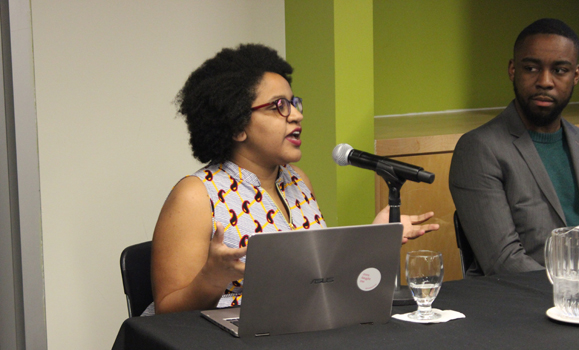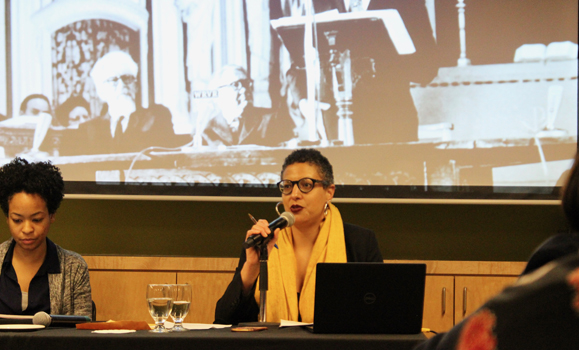On the third Monday of January every year, one of the most consequential figures in modern history is honoured by countries all over the world. Dr. Martin Luther King Jr’s life and work in improving rights for the Black community is celebrated on a day known as Martin Luther King day.
While MLK Day celebrates Dr. King’s life, it is also a day where discussion about the future of the Black community takes place. Dalhousie’s Black Student Advising Centre (BSAC) facilitates the celebration of MLK day by hosting events every year. This year, the event was held as a part of their “Black Lives Matter” series and was titled “The Legacy of MLK: Peacemaking & Justice Making in a Time of Trouble”, with experts on the subject matter from within the community participating in the conversation on the topic.
The panel discussion was preceded by opening words by Oluronke Taiwo, the Black Student Advisor with BSAC. She addressed a need for action, calling for a stand against all forms of discrimination and bigotry. “Justice does not come to those who wait”, she said.
Her words were followed by musical performances from Zamani Bernard-Miller and Amariah Bernard-Washington, both established musical performers within the Black community, who sang “Lift Every Voice and Sing” and “I am Light”.
An uphill battle
The panel consisted of Tari Ajadi, Asha Jeffers and Rachel Zellars and was moderated by Tiffany Gordon, a PhD student in Dalhousie’s Department of Philosophy who focuses on criminal justice system in North America. With each having different areas of expertise, they offered contrasting perspectives on the theme of the discussion.
Ajadi, a PhD student in Dalhousie’s Department of Political Science whose work focuses on policies and inequities that affect marginalized communities, spoke on Dr. King’s thoughts as seen in the “Letter from Birmingham Jail” and its transferability to a modern day context.
He stated that very little has changed since Dr. King’s time, noting how eerie it is that modern-day problems faced by the Black community are similar to those faced by the Black community back during the Civil Rights movement of the 1960s. “Like then and now, racism is a killer, it amplifies fear," he said, adding that racism caused Black families to live in a constant state of fear of the many ways they could be harmed.
Ajadi highlighted recent events involving mistreatment of the Black community, including the incident at a Walmart in Halifax that saw a physical altercation between a 23 year-old Black woman and officers of the Halifax Regional Police. “We know that our police forces and our schools have broken systems,” Tari stated, going on to say that society is “collectively complicit” with regards to racial discriminatory issues.
An example to follow
Dr. Jeffers, an assistant professor in Dalhousie’s Department of English and Department of Gender & Women’s Studies, shared her thoughts on some of the messages that can be extracted from “Letter from Birmingham Jail."

Dr. Jeffers
She quoted Dr. King who said “whatever affects one directly, affects all indirectly", going on to highlight the need for collective action in order to confront the increasing amount issues faced by the Black community. “Injustice must be rooted out by strong and persistent action,” she quoted, going on to advise that action now requires learning from the past but that it should not be bound to the methods of the past.
On rising tensions between the Black community and governmental institutions and others for a lack of action on racial issues, Dr. Jeffers said that tension was an important part of bringing about change. “In our troubled times, peace can seem hard to achieve," she said.
Dr. Zellers, an assistant professor in Saint Mary’s University's Department of Social Justice & Community Studies, commented on Dr. King’s role in creating movements that brought about change. She highlighted Dr. King’s 1967 Riverside Church speech in which he spoke out about the political contradictions of the Vietnam War, causing a swell in anti-Vietnam War sentiment amongst the Black community.

Dr. Zellars
She continued by speaking about what it would mean to centre Dr. King’s 1967 speech as a guidepost for the world at its current state and how to approach its problems. “There is a logic of punishment in current systems of governance that is punitive and destructive," she said, going on to echo Dr. King’s sentiment for the need for compassion and nonviolence and to “see the enemy’s point of view and to hear his questions."
The panel collectively agreed that action was required by the community in order to prevent the encroaching tide of racial issues. As Ajadi said, “we cannot succumb to silence.”

